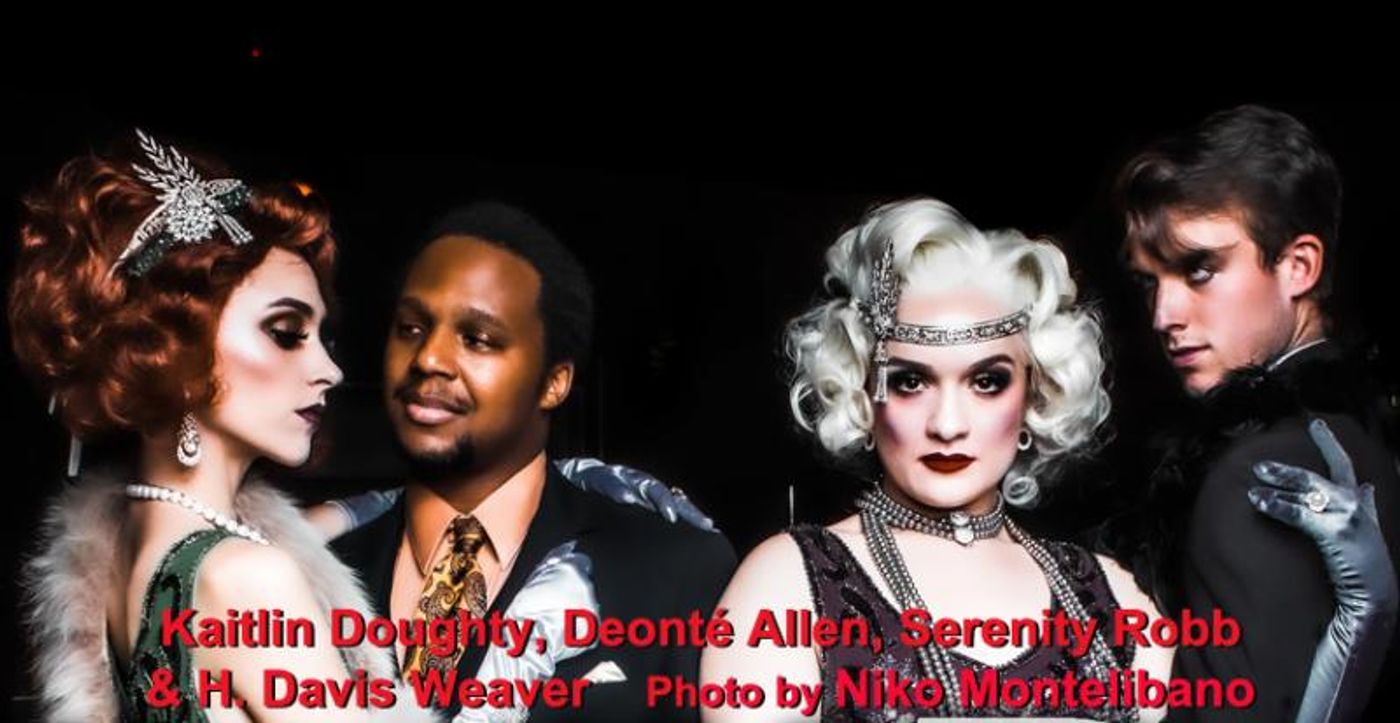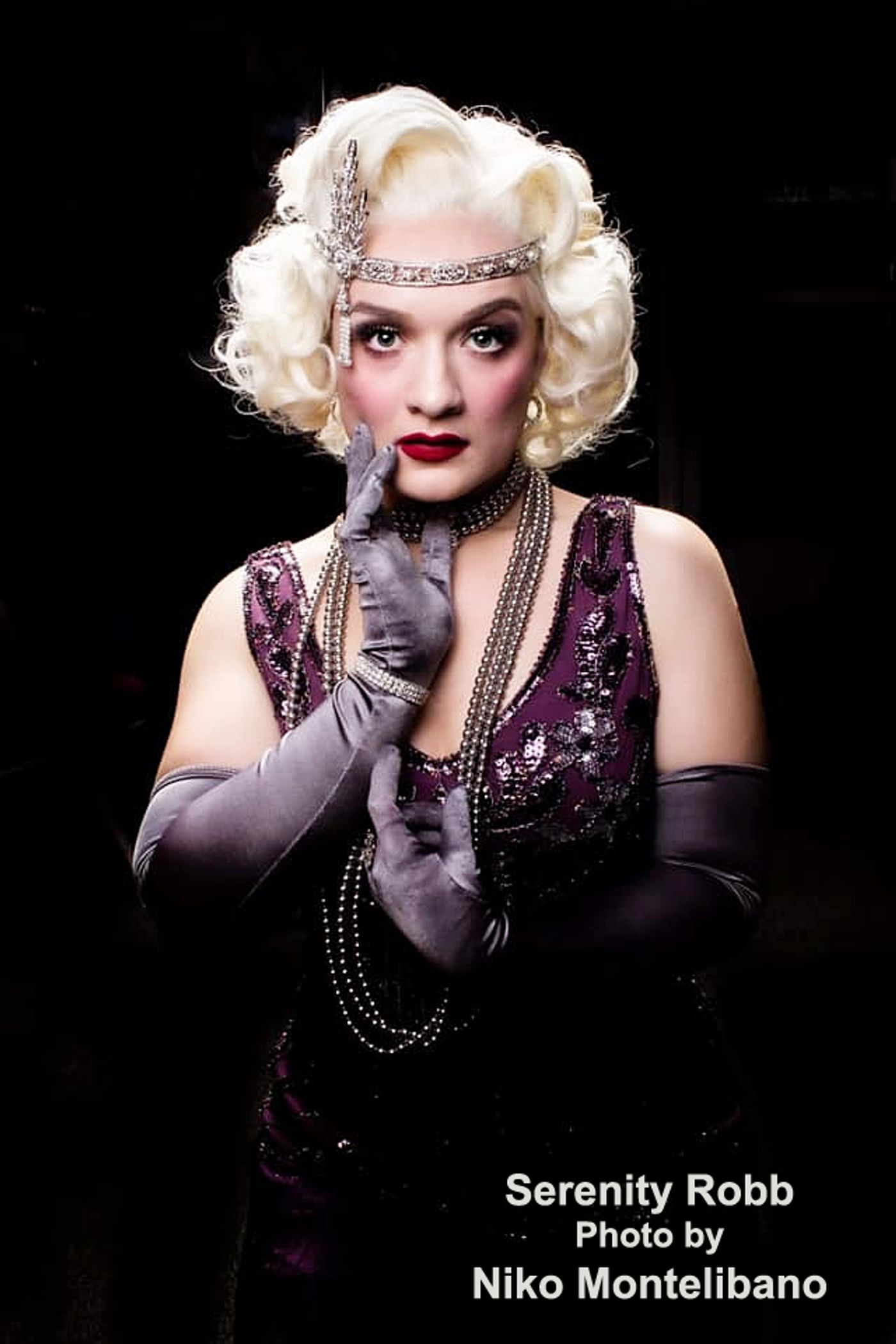Interview: Intimacy Coordinator Mia Schachter Keeping It Safe At THE WILD PARTY

Morgan-Wixson's latest mainstage production THE WILD PARTY, beginning March 13, 2020, has incorporated the not usually seen, but much needed intimacy coordinator to their offstage team of creatives/technicians. I had the wonderful opportunity to delve into the importance of having such a professional onsite to navigate comfortable boundaries in sex scenes in my interview with Mia Schachter, a certified IC and member of the Intimacy Professional Association.
Thank you for taking the time for this interview, Mia!
You've been working in theatre in New York for nearly ten years. Were you working both onstage and off-stage?
I was working off-stage as a playwright, a director, and a PA and assistant stage manager. I was doing everything I could in the theater. I had trained as an actor for many years, but I fell in love with directing, so I started writing, directing, and producing my own work. Then I worked for a playwright who abused his power to prey on the young women who worked for him (amongst a few other negative experiences), so I left to do ceramics and performance art for the last two years I was in New York. I moved back home to Los Angeles thinking I'd write for TV.
What was the lightbulb moment that made you decide to become an intimacy coordinator?
Even as I was writing and directing theater hoping to make a living doing that, my backup plan was to be a sex educator. When I moved home, a friend asked if I'd write a movie with her about a sex choreographer. As soon as we started writing, articles about intimacy coordination started coming out. Intimacy directors had been working in theater for years, but the role of intimacy coordinator for TV was very new. A few months later, I got a job as a casting assistant on The Affair. We hired Amanda Blumenthal as the intimacy coordinator on that show, and I asked if I could interview her for the character I was writing. At the end of the interview I asked how I could learn to do her job, and she offered to train me.
How does one go about becoming a certified intimacy coordinator?
There are two organization in the U.S. that train and certify IC's: Intimacy Directors and Coordinators (IDC) and Intimacy Professionals Association (IPA). They require set experience, and they train in specific methods of communication, getting and gauging consent and boundaries, choreography, basic film and cinematography vocabulary, mental health first aid, and so on. We learn the kinds of touch that indicate different themes in sexual scenes. We're trauma-informed, which means that, while we're not therapists or social workers, we have an understanding of what goes on in the brain during a trauma response so we can identify it and intervene.
This is relatively a new field, a new position on theatre or film sets. Did you know of any intimacy coordinators when you first started?
I only knew of Amanda who trained me, and Alicia Rodis who originated the role on HBO's The Deuce.
What's your take on SAG-AFTRA's Intimacy Coordinator Standards and Protocols? About time? Easy to understand? Anything missing?
I was involved in finalizing SAG-AFTRA's document on IC protocols. I think it's a good intro to what we do and who we are.
You've worked on a number of television series (HBO's Insecure and Perry Mason, ABC's Grey's Anatomy, Netflix' Twenties). Is THE WILD PARTY your first theatrical production?
 THE WILD PARTY is my first theatrical production as an intimacy director. I love TV and film, but my heart is in the theater.
THE WILD PARTY is my first theatrical production as an intimacy director. I love TV and film, but my heart is in the theater.
Any specific issues you find a stage play needs addressing that a film set might not?
The main issue in theater is that we have to be able to repeat the same choreography exactly the same way night after night, in front of dozens or hundreds of people. One benefit to theater is that we have more time to get to know each other and to find how the characters express themselves sexually. We have so much time to dive deep and develop the relationships between characters. What I love about theater is the process.
Are you able to describe an example of your work? Let's say, on Grey's Anatomy? Are your services needed more for the guest stars or day players than the series regulars of five, ten or sixteen seasons?
It completely depends on the actors, their experience in doing these kinds of scenes, and their own backgrounds. The power dynamic shifts depending on who it is. A series regular can be intimidating to a day player, for example. It can also depend on the director. Some directors want me to choreograph, others don't. Some see me as a collaborator more than others. I'm involved in prep, when I go over the director's vision and then relay that to the actors to help eliminate surprises, and also gauge their comfort level with the material, as well as, get a sense of their history with this kind of work. Then on the day we shoot, I make sure the set is closed, I facilitate a conversation between the actors about their boundaries, and I help smooth out movement. I make sure we don't see modesty garments or anything actors haven't agreed to show and I check in with them on an ongoing basis.
Who do you find most apprehensive of your presence as intimacy coordinator - women or men?
Some people love the idea of an IC, others are indifferent, and a handful are apprehensive. I've gotten the most resistance from women, both as actors and directors. For some, I think they feel like they've been doing this forever, and they don't "need" me, but that comes from a misunderstanding about what my job is. We're not psychologists, but there's definitely a misconception that we're there to coddle or babysit. All actors should always have had a buffer between them and the production when it comes to sexual content, but the fact that this job is new and sometimes required by the network makes some actors hesitant or even closed off to the idea. The other sentiment I experience is a feeling of, "Where have you been all this time?" I think that for a lot of women, appreciating the presence of an intimacy coordinator would bring bad experiences back into the forefront of their mind, and they'd have to examine them in a new light. I think there's some resentment for the fact that they weren't protected in the past. For directors who are not thrilled about ICs, the sense I get is that they feel they've been creating a safe environment for actors so they don't need me. This ignores the fundamental power dynamic on a set. I'm guessing, of course, but these are the impressions I've gotten over and over.
In this day of 2020, how would you differentiate harassment from flirting?
Consent.
Is it even 'safe' to flirt anymore? It's seems that it 'safer' to not even flirt at all, yes?
 Not at all. This is a concern that comes from a lack of empathy and listening. When someone flirts without empathy, they generally stop listening to the other person because they have motives, and they've fixed their mind on achieving their goal. This kind of flirting is performative, ego-driven, and result-oriented. It's a one-way street. Feeling for chemistry is a different thing. Seeing if you click with someone is a genuine and engaged practice in listening and being present with the other person, and then checking in with how you're feeling in their presence. That requires empathy. This form of communication is a two-way street. It includes reading someone's body language and accepting "no" for an answer, even if the "no" comes in the form of a lack of eye contact, crossed arms, or short, one-word answers. Those behaviors point to someone's discomfort or a lack of interest. If someone's flirting is preventing them from noticing these things, or if they persist despite these signs, then it becomes harassment. Flirting in the sense of talking to someone in order to determine if you're interested in each other is great, so long as both parties are engaged and the motives don't prevent both people from actually listening to each other and being willing to hear "no." Flirting shouldn't be something that one person is doing to another person; it should be something that both people are equally engaged in. That said, I would advise against this kind of communication in a work environment when there is a power dynamic at play.
Not at all. This is a concern that comes from a lack of empathy and listening. When someone flirts without empathy, they generally stop listening to the other person because they have motives, and they've fixed their mind on achieving their goal. This kind of flirting is performative, ego-driven, and result-oriented. It's a one-way street. Feeling for chemistry is a different thing. Seeing if you click with someone is a genuine and engaged practice in listening and being present with the other person, and then checking in with how you're feeling in their presence. That requires empathy. This form of communication is a two-way street. It includes reading someone's body language and accepting "no" for an answer, even if the "no" comes in the form of a lack of eye contact, crossed arms, or short, one-word answers. Those behaviors point to someone's discomfort or a lack of interest. If someone's flirting is preventing them from noticing these things, or if they persist despite these signs, then it becomes harassment. Flirting in the sense of talking to someone in order to determine if you're interested in each other is great, so long as both parties are engaged and the motives don't prevent both people from actually listening to each other and being willing to hear "no." Flirting shouldn't be something that one person is doing to another person; it should be something that both people are equally engaged in. That said, I would advise against this kind of communication in a work environment when there is a power dynamic at play.
In your boundary and consent workshops, how do you teach actors not to be paranoid about physical intimacy?
I teach actors how to find and communicate their own boundaries. The fear dissipates when actors know how to advocate for themselves. I haven't experienced what I'd call paranoia. There's a nervousness around these scenes that can paralyze actors if the action is vague, so I help move them through those nerves by empowering them with the language to build a list of what they're comfortable doing with their scene partner. I give them the knowledge of their own rights on stage or screen and how to advocate for themselves both to their scene partner and to the production, whether or not an IC is there.
What do you suggest a male actor do if he gets aroused during a intimate scene? Getting aroused would be, to some, a natural reflex. It's his reaction post-arousal that he needs to 'control,' yes?
I get this question a lot, but the reality is that arousal during this work is extremely rare. When it happens, it's usually just because the last time your body was in this position, it had a reaction and it's having that reaction again. If an actor is worried about that, I give them a safe word that tells me that I need to ask for a 5-minute water break. Filming these scenes is not sexy at all; it's actually extremely mechanical and technical. "Move your arm two inches forward to cover her pasties," or "Can you move your left shoulder three inches forward to hide your chest?" There's camera people, grips, and a boom operator in the room, and bright lights, and you have to remember your marks. It's not the kind of environment that is very conducive to the relaxed mental state most people need to be in to get aroused.
Any other misconception of the functions of an intimacy coordinator that you'd like to correct?
We're coordinators in a true sense-facilitating communication across all departments that need information about these scenes-and we're there to support the process. We talk to makeup, hair, costumes, production, the director, writer, sometimes even post-production. We're not the PC Police or HR, and we're certainly not there to direct the scene. Simply put, intimate scenes are now being treated with the same attention to detail as stunts, and it's about time.
Thank you again, Mia! I look forward to being at your WILD PARTY.
For ticket availability and show schedule through April 11, 2020; log onto www.morgan-wixson.org

Videos

